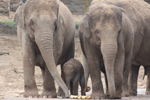Forensic-dating could end a major loophole in the current global ban on ivory, according to a new paper in the Proceedings of the National Academy of Sciences (PNAS). Scientists have developed a method to determine the age of ivory, allowing traders to tell the difference between ivory taken before the ban in 1989, which is still legal, and recently-poached ivory. Elephants across Africa are being slaughtered in record numbers for their tusks—the most recent estimate put it at 3,000 annually—due to rising demand for ivory in East Asia. Various loopholes have exacerbated the crisis.
“Our dating method is affordable for government and law enforcement agencies and can help tackle the poaching and illegal trade crises,” says lead author, Kevin Uno, with Columbia University’s Lamont-Doherty Earth Observatory.
Uno and his team measured radiocarbon levels in two different elephant tusks using an accelerator mass spectrometer. They then combined their findings with growth rates for modern elephant teeth to come up with the age of the ivory. Importantly, the methods could also be used to age rhino horns. Rhinos are also being decimated in Africa and Asia for the Asian traditional medicine market, despite the fact that research show rhino horn has no medicinal value.
The new method can be combined with another forensic test that allows officials to track the ivory to its source region. This was developed by Sam Wasser with the University of Washington’s Center for Conservation Biology in 2004.
“[Elephants] are environmental architects,” Wasser explains. “They keep woods down in the savannah and are the most important dispersers of seeds of rain forest trees. The central African rain forest is the second most important area on earth for capturing carbon dioxide and storing it.”

Graph courtesy of US State Department. Click to enlarge.
CITATION: Kevin Uno, Jay Quade, Daniel Fisher, George Wittemyer, Iain Douglas-Hamilton, Samuel Andanje, Patrick Omondi and Moses Litoroh. Bomb-curve radiocarbon measurement of recent biologic tissues and applications to wildlife forensics and stable isotope (paleo)ecology. PNAS. 2013.
Related articles
Authorities nab ringleader of poachers who killed 89 elephants in Chad
(06/27/2013) During one night in March, horse-riding poachers slaughtered 89 elephants in Chad, including over 30 pregnant mothers. Now officials say they have caught the ringleader behind the mass-killing: Hassan Idriss, also known as Gargaf.
African militias trading elephant ivory for weapons

(06/05/2013) The Lord’s Resistance Army (LRA) is using lucrative elephant poaching for ivory to fund its activities, according to a report published on Tuesday. Eyewitness accounts from park rangers, Lord’s Resistance Army (LRA) escapees and recent senior defectors report that the fugitive warlord Joseph Kony, who is wanted by the international criminal court for war crimes and crimes against humanity, ordered African forest elephants to be killed in Garamba national park in the Democratic Republic of Congo (DRC) and the tusks sent to him.
Connecting kids through elephants: innovative zoo program links children in the UK and India

(05/30/2013) You may think children in urban, northern UK have little in common with those in rural Assam, India, but educational connections are possible you just have to know where to look. In this case, an innovative education initiative at Chester Zoo has employed its five ton stars—the Asian elephants—to teach British children about life in faraway India.
Kenya getting tough on poachers, set to increase fines and jail time
(05/29/2013) The Kenyan parliament has approved emergency measures to tackle the on-going poaching crisis: last week Kenyan MPs approved legislation that should lead to higher penalties for paochers. The emergency measure passed just as Kenya Wildlife Service’s (KWS) is pursuing a gang of poachers that slaughtered four rhinos over the weekend. Both rhinos and elephants have suffered heavily as poaching has escalated in Kenya and beyond.
Featured video: a glimpse into the life of Cambodia’s Asian elephant
(05/29/2013) The Cambodian Government’s Forestry Administration has recently teamed up with the Wildlife Conservation Society (WCS) in order to peer into the daily lives of the country’s Asian Elephants (Elephas maximus). Through the use of camera traps, the organizations caught an intimate glimpse of the regular, day-to-day behavior of these animals.
Prince Charles: take the war to the poachers
(05/22/2013) Prince Charles has warned that criminal gangs are turning to animal poaching, an unprecedented slaughter of species that can only be stopped by waging war on the perpetrators, in the latest of a series of increasingly outspoken speeches about the environment. Addressing a conference of conservationists at St James’s Palace in London, the Prince of Wales announced a meeting of heads of state to take place this autumn in London under government auspices to combat what he described as an emerging, militarized crisis.
Gabon steps in to help protect elephants from ivory poaching at Central African Republic site
(05/18/2013) Gabon has agreed to help battle poaching in protected areas in the Central African Republic following an elephant massacre at a renowned World Heritage site, reports the Wildlife Conservation Society (WCS).
Elephants massacred for ivory in Central African Republic
(05/10/2013) Dozens of elephants have been slaughtered in the Dzanga Bai World Heritage Site in the Central African Republic just days after conservationists warned about an impending threat from the movement of 17 heavily armed poachers. The massacre occurred at a site renowned as ‘village of elephants’, where tourists and scientists have for decades observed wild elephants congregating at a large clearing to feed on minerals.
17 poachers allegedly enter elephant stronghold in Congo, conservationists fear massacre

(05/07/2013) Local researchers and wildlife guards say 17 armed elephant poachers have gained access to Dzanga Bai, a large waterhole and clearing where up to 200 forest elephants visit daily in the Central African Republic (CAR)’s Dzanga-Ndoki National Park. WWF, which works in the region but has recently evacuated due to rising violence, is calling on the CAR government to rapidly mobilize its military to stop another elephant bloodbath in central Africa. Elephants are being killed across their range for their ivory, which is mostly smuggled to East Asia.














